 |
| Sashi Chimala, CEO, Qwiky's, Jimmy
Mistry, MD, Della Tecnica, Vishambhar Saran, Chairman,
VISA Group |
The
new new thing isn't infotech, biotech, or nanotech. In fact, the
new new thing isn't actually new; it's just a different name for
old-fashioned individual enterprise. It's about the epiphanic process
by which some of us hit upon ideas that work. It involves a healthy
dose of opportunism, luck, and industry mixed into one compelling
brew. And it has everything to do with monotheism, with the ruling
deity being Mammon.
The great Indian infotech story of the 1990s
turned everyone's focus onto that business. Entrepreneurship became
synonymous with efforts in the area of software services. The consequent
dotcom boom (and bust), and the ensuing search for the next big
thing (biotech, software products, healthcare, bioinfomatics) blinded
most people to entrepreneurial initiatives in other sectors. Yet,
all through the go-go 1990s and the go-slow 2000s, individual enterprise
flourished in sectors as diverse as metals, organised retail, pharmaceuticals,
and tobacco.
This is the story of some of these entrepreneurs.
A few are traders who jumped onto the manufacturing bandwagon in
the 1990s. Several are former salarymen now doing their own thing.
And several others are young people who saw an opportunity and clutched
at it with both hands. Venture capital funds some; defection capital,
others; and family wealth, almost none. The enterprises found by
our selection have all made it big in the past five years, and the
oldest has its origin in 1993. Most boast a turnover around Rs 50
crore although the list has some biggies that do several times that,
and one or two that do significantly less. Enterprise, as the pages
that follow will prove beyond a doubt, is alive and well. Welcome
to the new new thing.
 |
Kamdhenu's Aggarwal: In the
thick of it |
Kamdhenu
Ispat
FOUNDED: 1996
BUSINESS: Steel
2002-03 TURNOVER:
Rs 200 crore |
PRADEEP AGGARWAL
Steel Satrap
Pradeep Aggarwal
is taking his time sipping a banana shake at Pavilion, the coffee
shop at Delhi's Maurya Sheraton hotel. That, he admits, is because
it has cost him two mid-sized Mahatmas; part of a trading family
that has seen its businesses razed to the ground, the 42-year-old
insists on getting the biggest bang for his buck.
After his family business of manufacturing
agriculture equipment, in Uttar Pradesh's Muzaffar Nagar, went bust
in the early 1990s, Aggarwal started trading in branded construction
steel. Having understood the intricacies of distribution, Aggarwal
felt that he could make it really big if he got into manufacturing
construction steel. In 1996, with money borrowed from friends and
relatives, and all his savings he set up Kamdhenu Ispat with a rolling
mill in Bhiwadi in Rajasthan. "I got lucky when demand for
galvanised steel bars shot up with a massive relocation of industrial
units out of Delhi due to a court order," explains the stocky
Aggarwal.
A fair sprinkling of fairy dust came in the
form the construction boom in Gurgaon and Noida in the late 1990s.
Ever since, Aggarwal has been gobbling up sick steel mills in Uttar
Pradesh, Rajasthan, and Madhya Pradesh for a song. Today Kamdhenu
Ispat's capacity is up to 1.5 lakh tonnes a year. "Mine is
a mix of baniyaa and professional business practices," explains
Aggarwal in chaste Hindi. "In matters of pricing and expenditure
I'm a baniyaa, whereas I leave marketing and production to professionals."
We'd like to call that the banana shake theory.
-T.R. Vivek
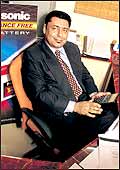 |
| Base's Arore: Dropout to battery king
(well, almost) |
Base
Systems
FOUNDED: 1997
BUSINESS: Batteries
2002-03 TURNOVER:
Rs 62 crore |
GIRISH ARORA
Modern Day Alchemist
Don't look for
a cause-effect relationship in it, but the son of a teacher couple,
Girish Arora, has a healthy disdain of academics. The Delhi School
of Economics dropout has what it takes to scoff at formal education;
after dabbling in the scrap paper, empty cement bags, and electronics
components businesses, Arora has finally made it big in the batteries
business (lead-acid to gold, ergo alchemist; see?). Base Systems
boasts a network of 216 'Base Terminals' across the country that
sell automotive batteries-an eponymous brand at the entry level
and co-branded Panasonic, Varta, Best & Best, and Yuasa batteries
at other price points-and ups systems. Arora's decision to shun
the Original Equipment Manufacturer (OEM) market ("lower margins,"
he shrugs) and some geographies like Maharashtra and West Bengal
do pose some constraints on growth, but Base still expects to do
over Rs 100 crore in sales this year. That's cause, claims Arora,
to consider a manufacturing facility, focus on reach, and aggressively
take on market leader Exide. "I have always dreamt big,"
laughs Arora. "You think small, you achieve small."
-Venkatesha Babu
 |
| Qwiky's Chimala: Just a typo separates
coffer and coffee |
Qwiky's
FOUNDED: 2000
BUSINESS: Coffee chain-plus
2002-03 TURNOVER: Rs 6 crore |
SASHI CHIMALA
Mr Bean
In hindsight,
everything was wrong with Sashi Chimala's decision to launch Qwiky's,
a chain of coffee bars. First off, he was 45, not exactly the right
age to start all over again. Then, there was the minor fact of the
timing: the year was 2000, and Chimala was the co-promoter of a
successful tech company, Indigo Technologies (earlier, he had helped
friend Raj Vattikutti build a company called Complete Business Solutions,
today's Covansys). Finally, there was the choice of market, Chennai,
the bastion of coffee drinkers. And so, Chimala's Chimayo Chains,
started vending coffee for Rs 30 and Rs 60 in a market where it
was otherwise available for Rs 5 (And that's on the higher side,
saar!). "If I was aware of South Indian nuances, I probably
wouldn't have started the venture," admits Chimala. But he
did, and it clicked. Today, there are 22 Qwiky's outlets across
five cities (eight in Chennai alone), the chain has an arrangement
with retail major Lifestyle for in-shop bars, it has spread its
wings to Sri Lanka and is looking to do so in Dubai, and Chimala
is eyeing revenues of Rs 100 crore by 2007. The mechanical engineer
who was reasonably well-known as a cartoonist in his college days
has also parlayed the learnings from his Qwiky's experience into
a revenue stream; a new company, Chimayo Chains BPO Limited offers
consulting services to other companies that wish to enter the food
retailing business in India. That's truly opportunistic.
-Nitya Varadarajan
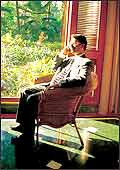 |
| Medicom's Govind: Another Wiproite turned
successful businessman |
Medicom
FOUNDED: 1993
BUSINESS: Software Products
2002-03 TURNOVER:
Rs 30 crore |
S. GOVIND
Aseptic Success
The world's largest
public sector hospital, the 3,500-bed Chris Hani Baragwanath Hospital
in Johannesburg runs on an it backbone developed by a relatively
unknown Indian software product firm, Bangalore-based Medicom. Founded
in 1993 by S. Govind, a Wipro employee-notch another one up for
the company that seems to produce an unending list of entrepreneurs-who
left to work in West Asia and two others, the company's eponymous
software suite for hospitals has met with significant success in
West Asia and Africa (which by itself makes the company unique in
the IT space). "We are aware that we are in a niche,"
says the 44-year-old IIT Kharagpur alum. "But we want to compete
with the world's best and take them on."
Next target: the much tougher European and
American markets. "We will try and grow organically, but if
a suitable acquisition presents itself, we will be ready to acquire
it at the right price," says Govind.
-Venkatesha Babu
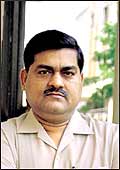 |
| Pataka's Hoosain: Actually, there are
502 reasons why he's here |
Pataka
Group
FOUNDED: 1996
BUSINESS: Beedis, Spun Silk,
Tea
2002-03 TURNOVER: Rs 450 crore |
MUSTAK HOOSAIN
On a Roll
In one of life's
delicious ironies, the man who owns India's largest-selling beedi
brand, 502 Pataka, smokes only India Kings cigarettes. That apart,
everything about 48-year-old Mustak Hoosain's looks spells ordinary:
He is of medium-height and prefers safari suits in light colours.
Born into a wealthy family in the Murshidabad district of West Bengal,
Hoosain entered the beedi business as a middleman, helping some
of the 1.5 million families in the region engaged in rolling beedis
find a market. But he had visions of organising the trade and in
1996 founded the Pataka group. Today, the group employs over 1,50,000
and Hoosain has leveraged elements of his original business model
to enter other businesses. Murshidabad is a sericulture centre and
the Pataka Group has set up a spun silk manufacturing unit. And
the 1.3 million strong distribution network for the beedis also
pushes 502 Pataka Chai. Next step: fruit and vegetable exports.
Hoosain travels 20 days a month, building the brand. Why, even the
phone numbers of all group offices end with 502.
-Debojyoti Chatterjee
 |
| Kaleesuwari's Swamy: There's no money
like oil money |
Kaleesuwari
Refinery
FOUNDED: 1996
BUSINESS: Edible Oil
2002-03 TURNOVER:
Rs 340 crore |
G. MUNUSWAMY
TN's own Texan Oil Millionaire
Chances are, you
haven't heard of G. Munuswamy, or G.M. Swamy, as the man prefers
he be called. Know him then, constant reader, as the man behind
the Gold Winner brand of edible oil.
With no education to boast of, Swamy, now 56,
came to Chennai as a 14-year-old to work at a grocer's. Seven years
later, he branched off on his own and in 1972, diversified into
the edible oil trade. In 1991, he acquired a sick oil refinery and
moved the machinery to Chennai. Keen to seed the market he bought
sunflower oil in bulk, and along with the refinery's produce, started
marketing the Gold Winner brand. By 1996, Swamy was convinced he
had the model down to a T. Kaleesuwari refineries (named for his
wife) was truly born the same year. Today, the refinery produces
9,000 tonnes of sunflower oil and 15,000 tonnes of palm oil a month.
Swamy has never been in the public eye before, but he shows no signs
of discomfiture during our meeting in his Vengaivasal (a suburb
of Chennai) office. He wipes a spot of dust on the window and speaks
fondly of his old oil trading outlet-"It shines like a jeweller's
shop"-and the 40 acres of agricultural land surrounding the
refinery where he grows paddy. Now testing the Mumbai market, Swamy
has a simple objective for his brand. ''It must win every time."
-Nitya Varadarajan
 |
| Luminus' Malhotra: Black good, Blackout,
better |
Luminus
Inverters
FOUNDED: 1996
BUSINESS: Inverters
2002-03 TURNOVER:
Rs 100 crore |
RAKESH MALHOTRA
Backup Baron
In power-starved
Delhi, anyone who says he'd love the city to get blacked out oftener
has a good chance of being lynched. Rakesh Malhotra isn't saying
that, but nonetheless he will turn up at his bank with a broader
smile every time the city goes powerless. That's because he manufactures
power inverters.
Luminus Inverters, which he started in 1996,
with just Rs 40,000 of his personal savings and a bank loan, today
boasts a turnover of nearly Rs 100 crore. Malhotra, now 40 and the
son of a conservative Delhi bureaucrat, shocked his family when
he quit a rather cozy job in the power electronics division of Siemens
as a project engineer. "Back in 1996, making inverters was
a cottage business and I saw a great opportunity to sell it as a
branded product," he says.
In 2002-03, he sold 1.2 lakh inverters (he
also makes voltage stabilisers and ups systems). Luminus has managed
to garner a 10 per cent marketshare, making it the market leader
in this highly fragmented market. And Malhotra is planning a big
push into the western and southern regions of the country. "In
the next five years, Luminus has the potential to touch the Rs 500-crore
mark," says Malhotra. We hope the country's power sector is
listening to him.
-T.R. Vivek
|
|
| Della's Mistry: Kahn-do attitude |
Della
Tecnica
FOUNDED: 1995
BUSINESS: Interior Design &
Projects
2002-03 TURNOVER:
Rs 52 crore |
JIMMY MISTRY
Designer Success
If one were to
look for a leitmotif in 31-year-old Jimmy Mistry's life, it would
have to be bikes. After completing a course in mechanical engineering,
Mistry sold his "first love", a Yamaha, for all of Rs
18,000 to fund his first venture. By the mid 1990s, he had started
importing and selling Italian furniture, but believed that he would
be better off adding value. "We wanted to corporatise our business,"
recollects Mistry, explaining Della Tecnica's transformation into
an interior solutions provider in 2000. The move helped: turnover
has zoomed from Rs 2 lakh in 1995 to Rs 52 crore today; the number
of employees, from six to 500; and clients include Star TV, A.C.
Nielsen and Bajaj Allianz. And so, Mistry can afford an office at
a 100-year-old colonial style building, a 32,000 sq ft production
centre at Daman, and a clutch of fast bikes. But he still misses
the Yamaha.
-Dipayan Baishya
 |
| TDV's Roy: Now, his cup trully runneth
over |
Triumph
Distillers and Vintners
FOUNDED: 2002
BUSINESS: Liquor
2002-03 TURNOVER:
Rs 125 crore |
DEEPAK ROY
The Professional Entrepreneur
Fifty-two year
old Deepak Roy became an entrepreneur in style, buying out the domestic
brands of the company he once worked for, Guiness UDV India. He
picked up a 15 per cent stake in the business, a consortium of investment
banks did the remaining 85 per cent that they eventually placed
with a subsidiary of UB that had itself bid unsuccessfully for the
brands. Roy, whose stake was funded by his sweat equity in Guiness
UDV India, finds himself heading a (Vijay) Mallya Group company
that he part owns. The name too, is of his own choosing, Triumph
Distillers & Vintners. "I decided to do what no professional
manager had ever done in India," says Roy. Today, the Rs 125-crore
company (net profit: Rs 12 crore), sells Gilbey's Green Label Whiskey,
Gilbey's Old Gold Whiskey, Gilbey's Gold Club Whiskey and Gilbey's
White Label Whiskey, has a deal with Polychem to manufacture and
market Alcazar Vodka, Men's Club Whiskey, Men's Club Brandy, and
Louis XI Delux Brandy, and is considering launching ready-to-drink
liquor mixes. "I am restructuring to cash in on synergies with
the UB Group," says Roy. The man who had set himself the goal
of becoming a CEO by 40-he was one by 39, of Herbertson's-starts
all over again as a manager-owner at 52.
-Swati Prasad
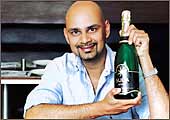 |
| Sula's Samant: 1998 was good year |
Sula
Wines
FOUNDED: 1998
BUSINESS: Wine
2002-03 TURNOVER: Rs 6 crore |
RAJEEV SAMANT
Going To California
The apex of civilised
life is to live between a city flat and a country retreat,"
smiles 35-year-old Rajeev Samant. That explains the man's decision
to chuck up a job with Oracle in the Valley and build a winery in
sleepy Nashik. Five years ago, with an initial investment of Rs
5 crore, he launched Sula Vineyards. Cold calls and word of mouth
helped, as did a weekly do Samant funded for doctcommers. The boom
went bust, but there has been no stopping Sula. From 30 acres then,
the company has grapes growing on 100 acres today, a number that
should treble by 2005. And Sula's Chenin Blanc, Sauvignon Blanc,
and Zinfandel have put it on the global wine map. As for California,
this year Sula will export 7,000 cases of its choicest blend to
the state. That's a full circle.
-Abir Pal
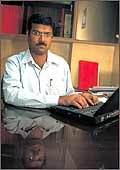 |
| JG's Seksaria: Under cover no more |
J.G.
Hosiery
FOUNDED: 1997
BUSINESS: Under-garments
2002-03 TURNOVER:
Rs 105 crore |
SANDEEP SEKSARIA
The Inside Story
If 28-year-old
Sandeep Seksaria had a little less ambition, he would have ended
up joining the family business of trading in cotton yarn at Kolkata's
Burrabazar, one of the country's largest wholesale trading markets.
Instead, the Kenny G and Richard Clayderman fan decided to enter
the hosiery business. Today, the Amul brand of undergarments is
fairly well-established, and Seksaria has ridden a bad couple of
years on the strength of his business model-complete outsourcing
and an emphasis on branding. Early in Amul's existence, Seksaria
roped in ad guru Alyque Padamsee to help design a communication
strategy for the brand. Today, with Amul enjoying salience in non-metro
cities and the lower and middle income groups in metros, Seksaria
is eyeing the upper income groups. And no, he doesn't plan to brand
the high-end offerings Perrier.
-Debojyoti Chatterjee
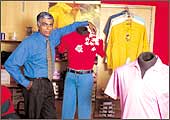 |
| Indus League's Srinivasan: Definitely
Upper crest, sorry, crust |
Indus
League
FOUNDED: 1999
BUSINESS: Apparel
2002-03 TURNOVER:
Rs 85-100 crore |
SRIRAM SRINIVASAN
The League Of Sleeves
The fact that he
launched Louis Philippe, Van Heusen, and Allen Solly during his
stint as President of Madura Garments makes Sriram Srinivasan, a
48-year-old IIT Chennai, IIM Calcutta alum unique. But Srinivasan
wanted to create a new kind of company. So, in 1999, along with
a clutch of former colleagues, he founded Indus League Clothing.
"The long-term potential for this business is very healthy,"
says Srinivasan. "We are confident of becoming a major player."
Given his track record, that's a claim few would doubt.
-Venkatesha Babu
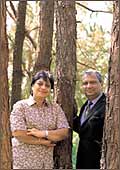 |
| VISA's Saran (with wife Saroj): The iron
man with a golden touch |
VISA
Group
FOUNDED: 1998
BUSINESS: Metals Trading
2002-03 TURNOVER:
Rs 670 crore |
VISHAMBHAR SARAN
There's Gold In Iron
In 1994, when Vishambhar
Saran opted to retire from TISCO (now Tata Steel), he took most
of his colleagues by surprise. After all, the then Director (Raw
Materials) looked set for bigger things in the company. But the
56-year-old had other ideas. He wanted to set new standards in international
trade. After tinkering around for a few years making the odd deal,
he finally formed the visa Group on April 1, 1998. "I did not
want to be an indenting agent,'' says Saran. "I wanted to build
a true trading house and deal in ferro alloys, and minerals.'' In
just five years, the mining engineer from Benares Hindu University
has done just that. With offices in London, Zug in Switzerland and
Beijing, Saran trades in ferro alloys, alumina, low-ash metallurgical
coke and chrome ore and serves customers across Australia, China,
Indonesia, and South Africa. Now, the avid golfer and art collector
has turned his attention to manufacturing and is building a 50,000
tonne-a-year chrome ore benefication plant and a couple of washeries
in Orissa. In TISCO, recollects Saran, he was part of a triumvirate
that included B. Muthuraman, then Director (Steel Marketing) and
Bhushan Raina, Director (Exports). Today, Muthuraman heads Tata
Steel, Raina, Tinplate, and Saran, his own Rs 670-crore enterprise.
Some triumvirate that.
-Debojyoti Chatterjee
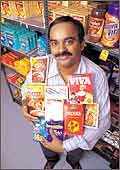 |
| Subhiksha's Subramanian: Nope, he doesn't
drive a pick-up |
Subhiksha
FOUNDED: 1997
BUSINESS: Discount Store
2002-03 TURNOVER:
Rs 365 crore |
R. SUBRAMANIAN
Playing It Like Sam
Even in the go-go
organised retail business in India, discount chain Subhiksha is
an outperformer. It has 136 outlets across Tamil Nadu and Pondicherry,
proposes to expand to Andhra Pradesh, Karnataka, Gujarat, and Maharashtra
by the middle of 2005, and is eyeing a turnover of Rs 1,500 crore
by then. And lest we forget, the business model followed by the
chain allows its stores to achieve a cash breakeven in the first
month. Equally striking is the profile of Subhiksha's founder R.
Subramanian, a 37-year-old with an IIT, IIM background and the requisite
stint at Citibank. He also started a finance company that is still
around. By 1996, Subramanian was ready to jump onto the emerging
retail bandwagon. Armed with a seed capital of Rs 50 lakh-capital
was to swell to Rs 25 crore in two years-he opened the first Subhiksha
outlet in Chennai in 1997. The response was staggering. "The
public thought the MRP on a pack was sacrosanct," he recollects.
"They couldn't believe that a retailer would sell at anything
less." Retail is hard work. Subramanian works from half past
seven in the morning till 11 at night. But he hasn't tired of it
yet.
-Nitya Varadarajan
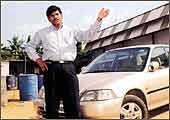 |
| Shodhana's Thota: Dr Giridhar, Medicine
Man! |
Shodhana
Labs
FOUNDED: 2000
BUSINESS: Pharma Products
2002-03 TURNOVER: Rs 8 crore |
GIRIDHAR THOTA
Life After The Lab
A technocrat and
long-term confidante of Dr Anji Reddy, Dr Giridhar Thota left Dr
Reddy's Labs when he realised that his career growth options were
limited. The company set him up with a soft loan and Shodhana, a
bulk actives and ingredients maker, was on. Initially, all the revenue
came from one customer, Dr Reddy's. Today, this is down to 20 per
cent and Thota is in the process of filing a European Drug Master
File for one of the company's product. Bravo!
-E. Kumar Sharma
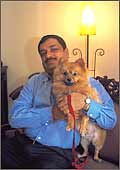 |
| SPS' Vohra: Branding helped |
SPS
Group
FOUNDED: 1999
BUSINESS: Steel
2002-03 TURNOVER:
Rs 300 crore |
BIPIN VOHRA
Success Or Bust
In 1999, Bipin
Vohra, now 40, and then Executive Director, at the SPS Group was
told he could either find another job or take over and see whether
he could turn things around. And so, Vohra inherited a small scarp
re-rolling mill that had plenty of debt and some Rs 7 crore in losses
(he raised the money from banks). Four years on SPS has profits
of Rs 5 crore, four mills in West Bengal, three in Orissa, and the
Elegant brand of construction steel. The absence of branded construction
steel in the East helped. As did, Vohra admits, "the government's
focus on the construction sector." Still, there's no denying
that there was a job to do. Vohra did it.
-Debojyoti Chatterjee
|

